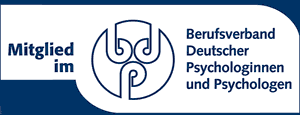Symptoms of Depression
Cognitive Behavioral Therapy in Hamburg-Altona-Ottensen and Plön Holstein
Symptoms of Depression:
Thoughts:
- Reduced thinking capacity
- Concentration difficulties
- Ruminating about the past
- Pessimism regarding the future
- Thoughts about one's own worthlessness
- Self-devaluation
- Recurring thoughts of death or suicide
- Unfounded self-reproach
Feelings:
- Hopelessness
- Inner restlessness
- Dejection
- Self-esteem is impaired
- Mood is depressed
- Sadness
- Inappropriate feelings of guilt
- Inadequacy
- Loss of joy
- Loss of self-confidence
- Despair
- Fear of the future
Motivation and Will:
- Loss of interest or pleasure in sexuality and other pleasant activities
- Indecisiveness
- Irresolution
- Loss of interest
Physical Reactions:
- Morning low
- Insomnia
- Sleep disturbances
- Early awakening
- Increased fatigue/exhaustibility
- Loss of appetite or increased appetite with corresponding weight change
Psychomotor:
- Reduced drive or activity
- Psychomotor agitation
- Psychomotor inhibition/slowing
Social Behavior:
- Reduced talkativeness
- Social withdrawal
Actions and Verbal Behavior:
- Crying
- Lamenting
- Inability to cope with the routine demands of daily life
- Suicidal behavior
Behavioral Therapy in Hamburg Altona Ottensen & Plön Holstein
a behavioral analysis of depression
Thinking determines information processing, experience and behavior. Thinking errors have been internally established and automated as basic assumptions, schemas, evaluations, thinking and attribution styles, attitudes, expectations, core beliefs, main assumptions, restrictive rules, self-talk, value attitudes...
Typical cognitive distortions are:
- Dichotomous – all-or-nothing thinking
- Magical thinking
- Magnifying negative experiences
- Minimizing positive successful experiences
- Moral-absolutistic thinking
- Personalizing
- Selective abstractions
- Overgeneralizing
- Exaggeration
- Imprecise labeling
- Arbitrary inference
Typical primitive-cognitive processing is:
- One-dimensional
- One-sided
- Moral
- Absolutistic
- Global, invariant
- Undifferentiated
- Irreversible
- Generalizing
- Distorted, illogical
- Inappropriate
Typical erroneous causal attributions (assumptions about the cause) of negative events:
- Internal instead of external
- Stable instead of variable
- Global instead of specific
Typical erroneous control attribution (assumptions about control): low perceived ability to influence certain events and behaviors
Previous schemas are activated by external events and become concrete in depression in a distorted, negative view of one's own person, the environment and the future: pessimism, worthlessness, self-devaluation, self-reproach...
These negative thoughts cause depressive feelings (hopelessness, sadness, feelings of guilt, inadequacy, loss of joy and self-confidence, despair, fear of the future...).
Cognitive behavioral therapy has developed techniques to identify and correct such dysfunctional (ineffective), irrational thought patterns.
Exhaustion model of depression
The Exhaustion Model of Depression
Depression can be understood as a consequence of persistent overload. This model explains how chronic stress can lead to a profound mental illness:
Effects of Chronic Stress
Long-lasting stress burdens the entire organism in multiple ways:
- Hormonal: The stress hormone system becomes overactivated
- Muscular: Permanent tension leads to muscle tightness
- Neurological: Brain structures and functions change
These burdens can push the body to its limits and put it into a state of exhaustion.
The Point of Overwhelm
There is a threshold beyond which the body is no longer able to recover on its own. When this point is exceeded, a chronic state of exhaustion can set in. This frequently manifests as depression.
Experience Report: A client reports on her experiences with coaching and psychotherapy in this context. Such personal experience reports can help to better understand and comprehend the theoretical model.
Helplessness model of depression
learned helplessness
Helplessness Model of Depression according to Seligman: Continuous failures and their attribution as uncontrollable inevitably lead to feelings of helplessness and powerlessness. These develop into depression. Earlier experiences in the background of one's own life history can contribute to this. The opposite is called sense of self-efficacy.
cognitive behavioral therapy for depression
in my practices in Hamburg-Altona-Ottensen and Plön Holstein
Modern behavioral therapeutic methods for treating depression have evolved in recent years and integrated new approaches. Here are some of the current methods:
- Mindfulness-Based Cognitive Therapy (MBCT):
- Combination of classic cognitive therapy and mindfulness techniques
- Aims at preventing relapses
- Acceptance and Commitment Therapy (ACT):
- Focus on acceptance of difficult feelings and thoughts
- Alignment of actions with personal values
- Metacognitive Therapy:
- Working on thought processes rather than thought content
- Reduction of rumination and worry
- Behavioral Activation (BA):
- Structured activity planning
- Focus on value-oriented action
- Schema Therapy:
- Working on early learned dysfunctional schemas
- Integration of elements from Gestalt therapy and psychoanalysis
- CBASP (Cognitive Behavioral Analysis System of Psychotherapy):
- Specifically developed for chronic depression
- Focus on interpersonal problems and situational analyses
- Computer-assisted Cognitive Behavioral Therapy:
- Online programs and apps to support therapy
- Enables flexible and low-threshold interventions
- Positive Psychology in Behavioral Therapy:
- Strengthening of resources and positive emotions
- Promotion of resilience and well-being
- Emotion Regulation Training:
- Learning strategies for better management of feelings
- Integration of elements from Dialectical Behavioral Therapy DBT
- Virtual Reality (VR) in Behavioral Therapy:
- Use of VR technologies for exposure exercises
- Simulation of real situations in a controlled environment
These modern approaches are characterized by a stronger integration of different therapy directions, a focus on acceptance and mindfulness, as well as the use of new technologies. They complement and expand classical behavioral therapeutic methods.
Behavioral therapeutic approaches play an important role in the treatment of depression. Here are some central elements:
- Activity Building:
- Gradual increase of pleasant and meaningful activities
- Structuring of daily routine
- Cognitive Restructuring:
- Identification and modification of negative thought patterns
- Learning more realistic perspectives
- Social Competence Training:
- Improvement of communication skills
- Building and maintaining social relationships
- Problem-Solving Training:
- Learning systematic problem-solving strategies
- Mindfulness Exercises:
- Promotion of presence in the here and now
- Reduction of ruminative thoughts
- Exposure:
- Confrontation with feared situations
- Reduction of avoidance behavior
- Behavioral Experiments:
- Testing negative assumptions in reality
- Self-Management Techniques:
- Self-observation and self-reinforcement
- Learning coping strategies
These approaches aim to reduce depressive symptoms, change dysfunctional thought and behavior patterns, and improve quality of life.
Depression German Flyer 1
contact Egon Molineus
If you would like to schedule an APPOINTMENT in my practice for psychotherapy in Hamburg Altona Ottensen & Psychotherapy Hohwacht Plön Holstein, then click on INQUIRY
Memberships:











